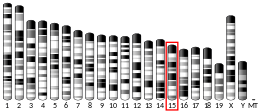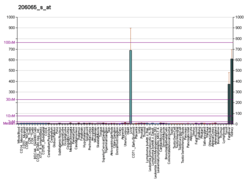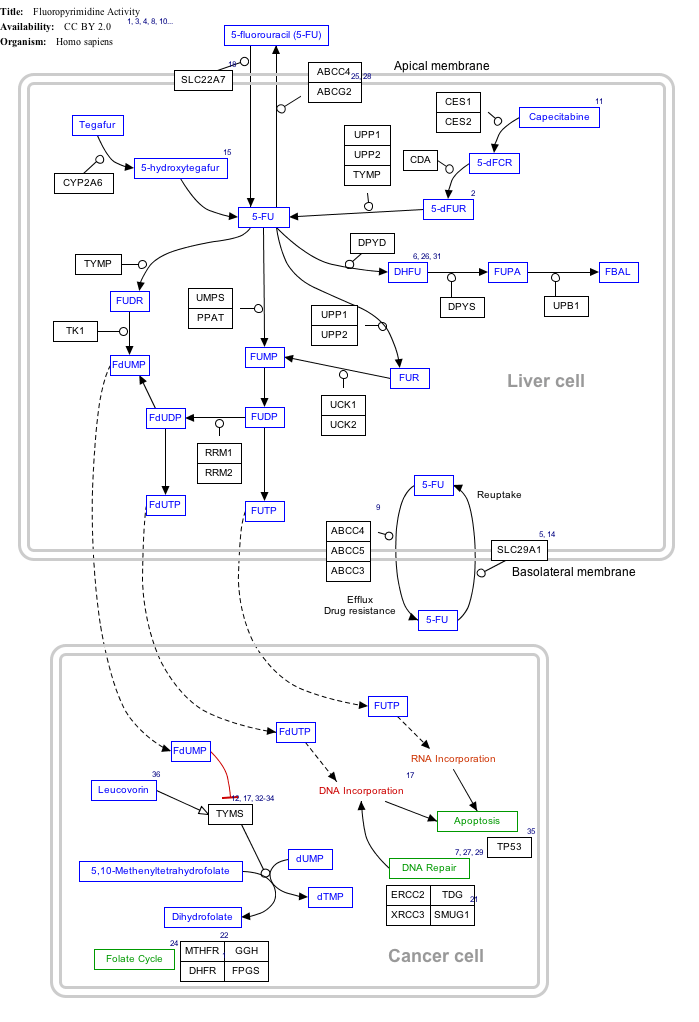DPYS
Dihydropyrimidinase is an enzyme that in humans is encoded by the DPYS gene.[5][6]
Dihydropyrimidinase catalyzes the conversion of 5,6-dihydrouracil to 3-ureidopropionate in pyrimidine metabolism. Dihydropyrimidinase is expressed at a high level in liver and kidney as a major 2.5-kb transcript and a minor 3.8-kb transcript. Defects in the DPYS gene are linked to dihydropyrimidinuria.[6]
Interactive pathway map
Click on genes, proteins and metabolites below to link to respective articles.[§ 1]
Fluorouracil (5-FU) Activity edit
- The interactive pathway map can be edited at WikiPathways: "FluoropyrimidineActivity_WP1601".
gollark: Or lisp.
gollark: Simple would be Haskell without all the language extensions.
gollark: It's not simple because they have a ton of bizarre special cases layered on top so it looks simplistic.
gollark: It's not, though.
gollark: Really? That was fast.
References
- GRCh38: Ensembl release 89: ENSG00000147647 - Ensembl, May 2017
- GRCm38: Ensembl release 89: ENSMUSG00000022304 - Ensembl, May 2017
- "Human PubMed Reference:". National Center for Biotechnology Information, U.S. National Library of Medicine.
- "Mouse PubMed Reference:". National Center for Biotechnology Information, U.S. National Library of Medicine.
- Hamajima N, Matsuda K, Sakata S, Tamaki N, Sasaki M, Nonaka M (Jan 1997). "A novel gene family defined by human dihydropyrimidinase and three related proteins with differential tissue distribution". Gene. 180 (1–2): 157–63. doi:10.1016/S0378-1119(96)00445-3. PMID 8973361.
- "Entrez Gene: DPYS dihydropyrimidinase".
Further reading
- Thomas HR, Ezzeldin HH, Guarcello V, et al. (2008). "Genetic regulation of beta-ureidopropionase and its possible implication in altered uracil catabolism". Pharmacogenet. Genomics. 18 (1): 25–35. doi:10.1097/FPC.0b013e3282f2f134. PMID 18216719.
- Thomas HR, Ezzeldin HH, Guarcello V, et al. (2008). "Genetic regulation of dihydropyrimidinase and its possible implication in altered uracil catabolism". Pharmacogenet. Genomics. 17 (11): 973–87. doi:10.1097/FPC.0b013e3282f01788. PMID 18075467.
- van Kuilenburg AB, Meijer J, Dobritzsch D, et al. (2007). "Clinical, biochemical and genetic findings in two siblings with a dihydropyrimidinase deficiency". Mol. Genet. Metab. 91 (2): 157–64. doi:10.1016/j.ymgme.2007.02.008. PMID 17383919.
- Rual JF, Venkatesan K, Hao T, et al. (2005). "Towards a proteome-scale map of the human protein-protein interaction network". Nature. 437 (7062): 1173–8. doi:10.1038/nature04209. PMID 16189514.
- Gerhard DS, Wagner L, Feingold EA, et al. (2004). "The status, quality, and expansion of the NIH full-length cDNA project: the Mammalian Gene Collection (MGC)". Genome Res. 14 (10B): 2121–7. doi:10.1101/gr.2596504. PMC 528928. PMID 15489334.
- Strausberg RL, Feingold EA, Grouse LH, et al. (2003). "Generation and initial analysis of more than 15,000 full-length human and mouse cDNA sequences". Proc. Natl. Acad. Sci. U.S.A. 99 (26): 16899–903. doi:10.1073/pnas.242603899. PMC 139241. PMID 12477932.
- Fukada M, Watakabe I, Yuasa-Kawada J, et al. (2001). "Molecular characterization of CRMP5, a novel member of the collapsin response mediator protein family". J. Biol. Chem. 275 (48): 37957–65. doi:10.1074/jbc.M003277200. PMID 10956643.
- Hamajima N, Kouwaki M, Vreken P, et al. (1998). "Dihydropyrimidinase deficiency: structural organization, chromosomal localization, and mutation analysis of the human dihydropyrimidinase gene". Am. J. Hum. Genet. 63 (3): 717–26. doi:10.1086/302022. PMC 1377410. PMID 9718352.
- Naguib FN, el Kouni MH, Cha S (1985). "Enzymes of uracil catabolism in normal and neoplastic human tissues". Cancer Res. 45 (11 Pt 1): 5405–12. PMID 3931905.
This article is issued from Wikipedia. The text is licensed under Creative Commons - Attribution - Sharealike. Additional terms may apply for the media files.





